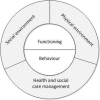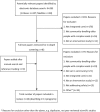Addressing safety risks in integrated care programs for older people living at home: a scoping review
- PMID: 32111170
- PMCID: PMC7048120
- DOI: 10.1186/s12877-020-1482-7
Addressing safety risks in integrated care programs for older people living at home: a scoping review
Abstract
Background: Many older people live at home, often with complex and chronic health and social care needs. Integrated care programs are increasingly being implemented as a way to better address these needs. To support older people living at home, it is also essential to maintain their safety. Integrated care programs have the potential to address a wide range of risks and problems that could undermine older people's ability to live independently at home. The aim of this scoping review is to provide insight into how integrated care programs address safety risks faced by older people living at home - an area that is rather underexplored.
Methods: Safety was conceptualised as preventing or reducing the risk of problems, associated with individual functioning and behaviour, social and physical environments, and health and social care management, which could undermine older people's ability to live independently at home. For this scoping review a systematic literature search was performed to identify papers describing integrated care programs where at least one intervention component addressed safety risks. Data were extracted on the programs' characteristics, safety risks addressed, and the activities and interventions used to address them.
Results: None of the 11 programs included in this review explicitly mentioned safety in their goals. Nevertheless, following the principles of our conceptual framework, the programs appeared to address risks in multiple domains. Most attention was paid to risks related to older people's functioning, behaviour, and the health and social care they receive. Risks related to people's physical and social environments received less attention.
Conclusion: Even though prevention of safety risks is not an explicit goal of integrated care programs, the programs address a wide range of risks on multiple domains. The need to address social and environmental risks is becoming increasingly important given the growing number of people receiving care and support at home. Prioritising a multidimensional approach to safety in integrated care programs could enhance the ability of health and social care systems to support older people to live safely at home.
Keywords: Community care; Elderly; Integrated care; Older people living at home; Prevention; Primary care; Risks; Safety; Scoping review.
Conflict of interest statement
The authors declare that they have no competing interests.
Figures


References
-
- Marengoni A, Angleman S, Melis R, Mangialasche F, Karp A, Garmen A, et al. Aging with multimorbidity: a systematic review of the literature. Ageing Res Rev. 2011;10(4):430–439. - PubMed
-
- Hoogendijk EO, Afilalo J, Ensrud KE, Kowal P, Onder G, Fried LP. Frailty: implications for clinical practice and public health. Lancet. 2019;394(10206):1365–1375. - PubMed
-
- World Health Organization . World report on ageing and health. Luxembourg: World Health Organisation; 2015.
-
- Eurostat. People in the EU: who are we and how do we live? Luxembourg: European Union; 2015.
Publication types
MeSH terms
Grants and funding
LinkOut - more resources
Full Text Sources

